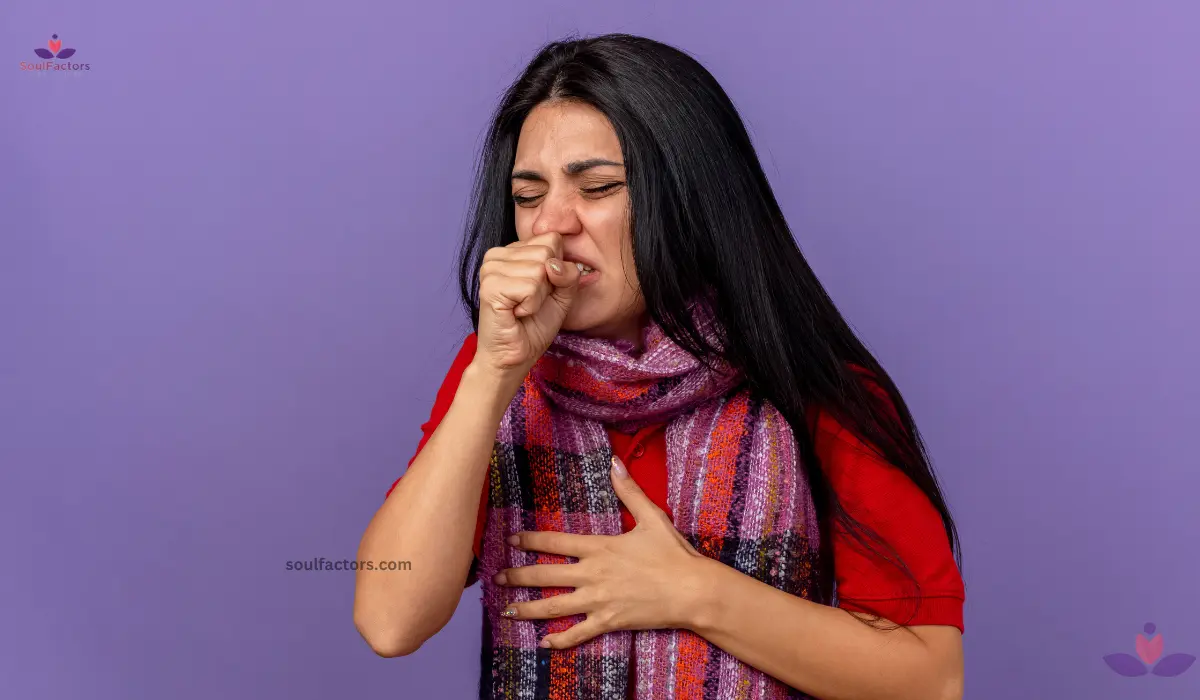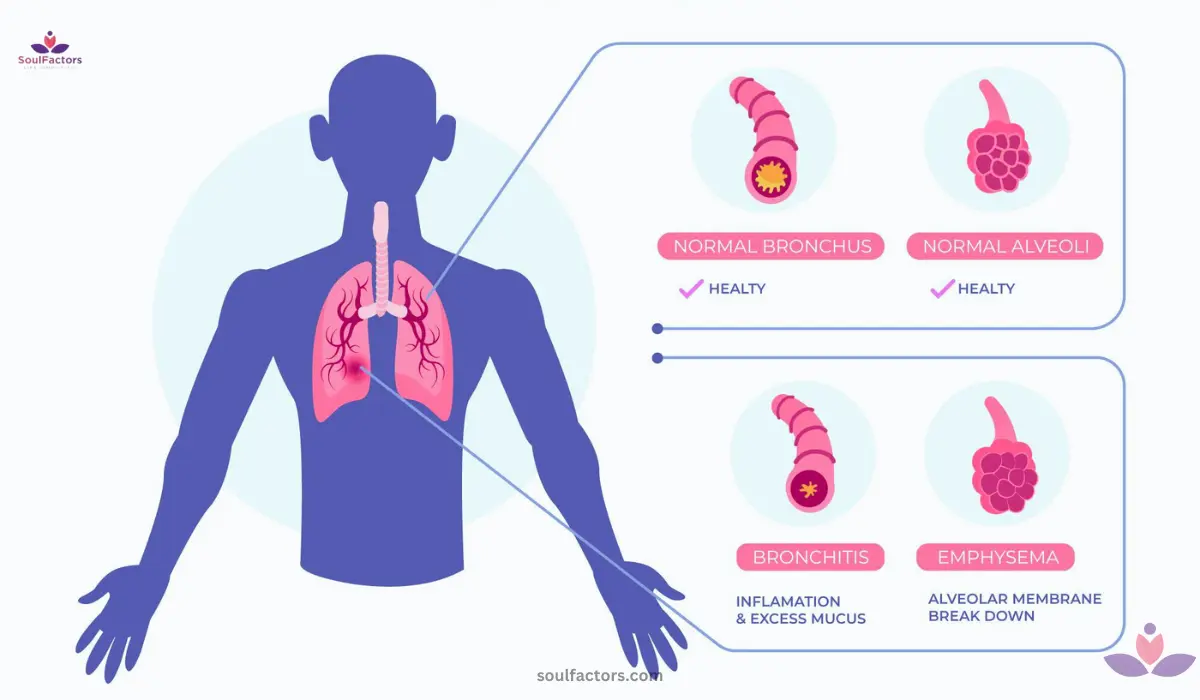How To Manage A COPD Flare-Up? In 2024
Living with COPD isn’t easy, and flare-ups can be especially challenging. But by understanding how to Manage a COPD Flare-Up? knowing the symptoms to watch for, and having a solid plan in place, you can get through them.
On Mar 20, 2024 – 6 minutes read

Chronic Obstructive Pulmonary Disease, or COPD, is a lung condition that makes it hard to breathe. It gets worse over time and can affect your quality of life. One of the toughest parts of living with COPD is dealing with flare-ups. A COPD flare-up is when your symptoms suddenly get much worse. You might have more coughing, more mucus, and a harder time catching your breath. Flare-ups can be scary, but there are things you can do to manage them. Knowing how to manage a COPD flare-up? the symptoms of a COPD flare-up, the stages of treatment, and the best ways to handle flare-ups can help you stay in control. In this article, we’ll walk through what you need to know about how to manage a COPD flare-up. With the right knowledge and plan, you can get through flare-ups and keep living your life.
What Are The Symptoms Of A COPD Flare-Up?
A COPD flare-up is a period when your COPD symptoms are much worse than normal. The symptoms of a COPD flare-up can include:
- More coughing than usual
- Coughing up more mucus, which may be yellow or green
- Feeling more short of breath
- Wheezing or chest tightness
- Feeling very tired
- Trouble sleeping
- Swelling in your feet or ankles
If you have these symptoms and they aren’t getting better with your normal COPD treatments, you may be having a flare-up. Flare-ups are often caused by an infection like a cold or the flu, air pollution, or other lung irritants. Sometimes the cause isn’t clear. The important thing is to take action quickly.

How to Manage a COPD Flare-Up?
What is the first step in the management of COPD? especially during a flare-up? The most important thing is to have a plan worked out with your doctor ahead of time for what to do. This usually involves having certain medications on hand to use right away when a flare-up starts. These might include
- Quick-relief inhalers (like albuterol) to open up your airways
- Oral steroids (like prednisone) to reduce inflammation
- Antibiotics if your doctor thinks you have a bacterial infection
So, how do you manage the exacerbation of COPD? Start these medications as soon as you realize you’re having a flare-up. Don’t wait for things to get really bad. You’ll also want to:
- Use your oxygen if you have it
- Get plenty of rest
- Drink lots of water
- Avoid smoke and other lung irritants
Call your doctor if things aren’t improving after a day or two on your flare-up plan
What are the 4 Stages of COPD Treatment?
We have answered – how to manage a COPD flare-up. But how do you treat COPD? There are typically 4 stages of COPD treatment, depending on how severe your COPD is
- Mild COPD: Using inhalers as needed for symptoms, plus a yearly flu shot
- Moderate COPD: Daily maintenance inhalers, possible nebulizer treatments, pulmonary rehab
- Severe COPD: Above treatments plus oxygen therapy
- Very Severe COPD: All the above treatments, plus possible surgery like lung volume reduction
During a flare-up, you may need to temporarily bump up to the COPD flare-up treatment, like adding oral steroids. It’s important to work closely with your doctor on an ongoing basis so you understand what stage you’re at and what to do for flare-ups.
What is the Best Way to Manage COPD?
In general, the best way to manage COPD is to stick to your treatment plan every day, not just during flare-ups. This means:
- Taking your medications exactly as prescribed
- Using your oxygen as directed
- Not smoking and avoiding secondhand smoke
- Staying up to date on flu and pneumonia shots
- Eating a healthy diet
- Staying as active as possible (ask about pulmonary rehab)
- Seeing your doctor regularly
By taking good care of yourself every day, you can help prevent flare-ups. But of course, flare-ups can still happen sometimes even if you’re doing everything right. So it’s important to know how to manage a COPD flare-up when it does happen.
The key is to have a clear plan and not hesitate to use it. Many people try to tough it out at home for too long. But quick action at the first sign of a flare-up can help you get back to normal much faster. Starting medications early can prevent things from escalating to the point where you need emergency care or a hospital stay.
What is the Best Medication for COPD Flare-Ups?
The best medication for COPD flare-ups depends on the severity of the flare-up and the individual’s specific treatment plan. However, some common medications used to manage COPD exacerbations include:
- Short-Acting Bronchodilators: These are usually the first-line treatment for COPD flare-ups. They help relax the airways and make breathing easier. Examples include albuterol (ProAir, Ventolin) and levalbuterol (Xopenex).
- Oral Corticosteroids: These help reduce inflammation in the airways. They are typically prescribed for moderate to severe COPD flare-ups. Examples include prednisone and methylprednisolone.
- Antibiotics: If a bacterial infection is suspected to be the cause of the flare-up, antibiotics may be prescribed. Common choices include amoxicillin, doxycycline, and azithromycin.
- Oxygen Therapy: If oxygen levels are low during a flare-up, supplemental oxygen may be necessary to help with breathing and to prevent further complications.
- Nebulized Treatments: In some cases, bronchodilators or steroids can be delivered through a nebulizer, which turns the medication into a fine mist that can be inhaled deep into the lungs.
It’s crucial to work with your healthcare provider to develop an individualized action plan for managing COPD flare-ups. This plan should include specific instructions on which medications to use, when to use them, and when to seek emergency care. Always follow your doctor’s advice and don’t hesitate to ask questions about your flare-up management plan.
How to Avoid COPD Flare-Ups
Of course, the very best strategy is to prevent flare-ups in the first place as much as you can. Avoiding COPD flare-up triggers is key. The biggest ones are:
- Infections like colds or flu (so wash your hands often and avoid sick people)
- Smoke and air pollution (stay inside on bad air days, avoid wood fires, never allow smoking in your home)
- Not taking your daily controller medications
But even if you avoid triggers, have a solid daily management plan, and follow your treatment, flare-ups may still happen from time to time. So always be prepared with your doctor-approved plan for how to manage a COPD flare-up. Quick action is the best way to get back to breathing easier again.
Conclusion
Living with COPD isn’t easy, and flare-ups can be especially challenging. But by understanding how to Manage a COPD Flare-Up? knowing the symptoms to watch for, and having a solid plan in place, you can get through them. Remember, a COPD flare-up means your symptoms have gotten worse and aren’t improving with your usual daily care.
Key flare-up management strategies include using quick-relief inhalers, starting oral steroids and antibiotics if prescribed, resting, hydrating, avoiding irritants, and calling your doctor if things aren’t getting better after a couple of days. Using oxygen and sticking to your regular daily COPD management plan is also crucial during a flare-up.
The best approach is prevention – get your flu and pneumonia vaccines, wash your hands often, avoid irritants like smoke, take your daily medications, and see your doctor regularly to keep your COPD action plan up to date at every stage. But even with the best prevention strategies, most people with COPD will still have flare-ups sometimes. So work with your healthcare team to create a clear flare-up management plan, and don’t hesitate to use it.
By being prepared, acting quickly, and having support from your medical team, you can get through COPD flare-ups and maintain the best quality of life possible. With a solid plan in place, COPD doesn’t have to keep you from living your life. You’ve got this! Now I’m curious to hear from our readers – what strategies have you found most helpful for managing COPD flare-ups? Let us know in the comments!

Subscribe to Newsletter
Elevate your routine, stay on trend, and embrace a personalized beauty journey with our curated insights.





Write a Comment